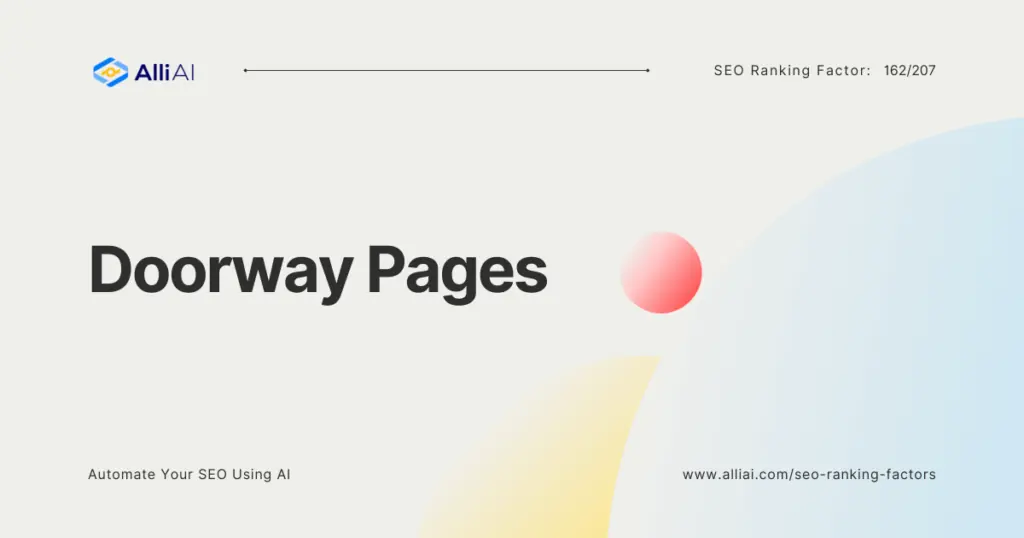What Does Doorway Pages Mean?
Doorway pages are web pages created with the primary purpose of ranking high in search engine results for specific phrases, mainly to redirect visitors to a different webpage. They are often of poor quality and are used to manipulate search engine indexes to gain more traffic. However, they provide little value to users and can lead to penalties from search engines like Google, which consider them a form of search spam.
Where Does Doorway Pages Fit Into The Broader SEO Landscape?
Doorway pages are considered a black hat SEO technique because they are designed to manipulate search engine indexes by inserting large amounts of optimized content and keywords to rank for specific queries. These pages often provide little to no value to users and are used primarily to redirect them to another part of the website or to multiple other sites under the same organization. Search engines, like Google, discourage the use of doorway pages because they degrade the user experience and the quality of search results. As a result, websites using doorway pages risk penalties, including lower rankings or removal from search index databases.
Real Life Analogies or Metaphors to Explain Doorway Pages
Doorway pages are like bait-and-switch tactics in a magic show. The magician lures you in with a promise of one trick, but then suddenly switches to something entirely different, leaving you in an unexpected place.
Alternatively, think of doorway pages as the misleading trailheads in a maze. Each doorway promises a direct route to the cheese, yet they all funnel you down the same convoluted path that may or may not lead to what you were originally seeking.
How the Doorway Pages Functions or is Implemented?
1. Identification of Target Keywords: SEO experts identify sets of keywords that they aim to rank for, often addressing various regions or specific aspects of their products or services.
2. Creation of Doorway Pages: Separate pages are created for each set of targeted keywords. These pages are designed specifically to rank well in search engines for their targeted terms.
3. Page Optimization: Each doorway page is optimized for SEO including keyword-rich content, meta tags, and sometimes spammy tactics like keyword stuffing to improve search engine rankings.
4. Content Duplication or Slight Modification: Content between these pages is often very similar or duplicated, with only slight modifications to target different keywords or regions.
5. Redirection: Visitors to these pages are often immediately redirected to a more relevant or general page where the actual content or intended user interaction is possible.
6. Linking Strategy: Doorway pages may also be heavily linked to/from other sites to increase the authority and ranking potential of the page in search engine results.
7. Tracking and Analysis: The effectiveness of doorway pages is monitored through tracking metrics like traffic, bounce rate, and conversion rate to adjust strategies as necessary.
Impact Doorway Pages has on SEO
Doorway pages negatively impact a website’s SEO performance and rankings as they are typically created to manipulate search engines by targeting specific keywords to funnel users to a particular page. This practice goes against search engine guidelines, such as Google’s Webmaster Guidelines, which can lead to penalties, including downranking or even removal of the website from search results. Additionally, doorway pages often provide a poor user experience as they may lack substantial content or relevance and primarily serve to redirect users to other pages, leading to user frustration and increased bounce rates.
SEO Best Practices For Doorway Pages
1. Identify the target keywords for each doorway page.
2. Create unique, individual landing pages for each target keyword.
3. Ensure that the content on each page is relevant, meaningful, and offers value to the user.
4. Optimize each doorway page by including the target keyword in the title tag, meta description, header tags, and throughout the content.
5. Include strategic internal links on each doorway page to direct users and search engine crawlers to other relevant and useful pages on your website.
6. Implement geographical targeting if the doorway pages are meant to attract traffic for location-based searches.
7. Ensure that each doorway page is mobile-friendly and loads quickly.
8. Regularly update the content on the doorway pages to keep them fresh and relevant.
9. Monitor the performance of each doorway page in terms of traffic and conversion rates, and make adjustments as necessary.
10. Avoid using overly aggressive SEO tactics such as keyword stuffing, hidden text, or misleading redirects, to ensure compliance with search engine guidelines.
Common Mistakes To Avoid
1. Violation of Search Engine Guidelines: One of the biggest pitfalls with doorway pages is that they often violate search engine guidelines, such as Google’s Webmaster Guidelines. Creating pages with the primary purpose of driving traffic to a particular site without providing additional value can lead to penalties.
2. Risk of Penalization: Using doorway pages can result in severe penalties, including removal from search engine indexes. This can drastically reduce organic traffic and harm the long-term visibility of a website.
3. Poor User Experience: Doorway pages typically offer a poor user experience. They are usually optimized for specific keywords or phrases and redirect users to a different page, which can confuse and frustrate visitors.
4. Damage to Brand Reputation: Engaging in deceptive practices like doorway pages can harm a brand’s reputation. If users feel misled, they may develop a negative perception of the brand, impacting customer retention and acquisition.
5. Resource Waste: Investing time and resources into creating doorway pages diverts focus from more effective and ethical SEO strategies that could genuinely improve site visibility and user engagement.
—
Ways to Steer Clear:
1. Focus on Quality Content: Rather than creating doorway pages, invest in developing high-quality, relevant content that genuinely addresses the needs and questions of your audience.
2. User-Centric Design: Design your website with user experience in mind. Ensure that navigation is logical and that pages genuinely add value to the user’s journey.
3. Ethical SEO Practices: Use ethical SEO strategies such as proper keyword usage, quality link building, and enhancing the user experience. Avoid manipulative SEO tactics and adhere to search engine guidelines.
4. Regular Audits: Conduct regular website audits to identify and remove any content that could be construed as a doorway page. This not only enhances site quality but also aligns with best SEO practices.
5. Engage in Holistic Marketing: Instead of relying on questionable SEO tactics, develop a diversified digital marketing strategy that includes social media, content marketing, and PPC advertising to drive traffic and enhance visibility.






